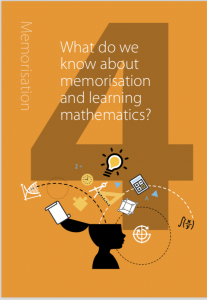Maggie and Duane continue digging into the OECD report “Ten Questions for Mathematics Teachers…and how PISA can help answer them.”
You can download the report here…
If you have any questions, comments, or suggestions, please Tweet us at @dhabecker and @pelelover1
Show notes at http://theothermath.com
 Question #4: What do we know about memorization and learning mathematics?
Question #4: What do we know about memorization and learning mathematics?
Every mathematics course involves some level of memorization. PISA data suggest that the way teachers require students to use their memory makes a difference. Data indicate that students who rely on memorization alone may be successful with the easiest mathematics problems, but may find that a deeper understanding of mathematics concepts is necessary to tackle more difficult or non-routine problems.
Let’s dig a little deeper into this subject…
HOW PREVALENT IS MEMORIZATION AS A LEARNING STRATEGY IN MATHEMATICS?
To find out how students around the world learn mathematics, PISA asked those students whether they agreed with statements that corresponded to memorization strategies.
Not too surprisingly, PISA findings reveal that memorization in mathematics is commonplace around the world. In almost every country, when students were asked about the learning strategies they use, they identified some sort of memorization-related strategy. Essentially, there is international consensus that memorization leads to mathematics “automaticity”, speeding up basic arithmetic computations and leaving more time for deeper mathematical reasoning.
WHO USES MEMORIZATION THE MOST?
Of the 35 OECD countries participating in the PISA, students in the United States use memorization strategies more often than the OECD average. Many countries that are amongst the highest performing countries on the PISA are less likely to report memorization as a learning strategy.
PISA data suggest that students who mainly use memorization, drilling, or repetitive learning, likely are using that memorization to avoid intense mental effort, especially if they do not feel confident with mathematics. Rote memorization is used in lieu of – not in addition to – conceptual understanding.
PISA results also show that, across OECD countries, students with positive attitudes about math, who have little or no anxiety towards mathematics are somewhat less likely to use memorization strategies.
In a nutshell, students who rely on memorization are more likely to exhibit math anxiety. The less a student relies on memorization, the more likely that students will have high self-efficacy in mathematics.
WILL MEMORIZATION HELP OR HURT MY STUDENTS’ PERFORMANCE IN MATHEMATICS?
Memorization seems to be a somewhat effective way to learn the easiest math problems, but as the problems get more difficult, students relying on memorization are less likely to be successful. No matter the level of difficulty of the math problems, students who rely on memorization alone are never more successful in solving math problems compared to students relying on strategies other than memorization.
Let’s be clear…there is a difference between rote memorization and learning through repetition. When students practice through repetition (repetition is a form of memorization), math anxiety goes down, procedures become less challenging, and students are more successful in solving difficult problems.
WHAT CAN TEACHERS DO?
- Encourage students to complement memorization with other learning strategies.
- Some memorization, such as recalling a formula or developing automaticity with simple calculations, is beneficial because it frees up time for deeper thinking.
- Use memorization strategies to build familiarity and confidence.
- Repeating certain procedures through drill, which is a form of memorization strategy, helps students consolidate their understanding of concepts. Teachers can use games or interactive software to make this practice more engaging.
- Be aware of how your students are learning.
- Notice students who seem to be relying too much on memorization. Pair that memorization with learning strategies that build upon conceptual understanding.
ALL KINDS OF MINDS:
.
.
.
